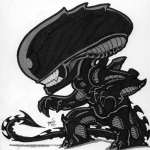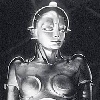
esther85
MemberOvomorphJun-17-2017 1:28 AMThis opera gives a frame for the film, seems, it has an important role in the AC's interpretation. What do you think, why do the writers choose this opera?
I think, there could be connections between the characters, but I'm not sure, is it correct or not.
Wotan could be David, as he is very egoist, selfish, he created the Valhalla, wants tó possess the love (=Freia/Shaw) and the power (=nibelung's ring/black goo) in the same time. That's why he stole the nibelung's ring from Alberich. But in the end he realises, the curse of the ring is too strong, so he doesn't want it anymore. Erda (the opposite of Wotan, godess of Earth) aware him: every creature needs an end, even if it is a god. So how could hé (Wotan) stands in this kind of cursed life? (I can't translate it very well, sorry).
So ín my opinion the Rheingold = the sacr. black goo. The nibelung's ring = the black goo. Alberich, who made the ring from the Rheingold and that's why gave up the feeling of love = could be the Engineers, but Alberich is dwarf... So it's not the best link. Freia, the goddess of beauty, she is the deal for creating the Valhalla. If she isn't with the gods, the gods started getting older, dying. = Shaw. Erda =?
So at this point, and if this interpretation is correct, will David realise the curse of the black goo? Maybe in the next movie. Or what do you think, why is this opera so important in this film?

BigDave
MemberDeaconJun-17-2017 6:55 AMI think the Opera is no Accident just for a track.... it has a connection but it is only a partial one and so it is not like every scene from Das Rheingold will apply and those themes which do are in a loose way.
But indeed there are bound to be a few connections for certain, and the David Renouncing Love certainly fits.
R.I.P Sox 01/01/2006 - 11/10/2017

Ripleys_Ghost
MemberFacehuggerJun-17-2017 10:37 AMJust as an aside, I found it interesting that when David plays Das Rheingold, Weyland states that sounds a bit thin without the orchestra (paraphrasing here). For David himself, he finds it sufficient... he sets himself apart (center stage, so to speak), and has little desire to play with others...

Burke, Carter J.
MemberOvomorphJun-17-2017 12:06 PMIn the Novelization, David actually gives some information about the particular piece he is playing: He says: "The gods have rejected mankind as weak, cruel, and filled with greed, so they are leaving the Earth forever and entering their perfect home in the heavens-the fortress of Valhalla."
So basically it's an allegory for the engineers being disappointed in their creation and them forsaking mankind to never return. Valhalla here being Paradise or Planet 4.
David continues: "But every step they take is fraught with tragedy because the gods are doomed. They are fated to die in a cataclysmic fire destined to consume not only them, but Valhalla itself."
So clearly, this is exactly what David does to the engineers and the entire planet while he's at it.
"They are as venal as the humans they have rejected, and their power is an illusion."
The last sentence mirrors Davids sentiments toward humans and the engineers.
So in the end, the exact piece that David is playing perfectly fitted the character and I believe that's why it was chosen.
Oh, and as for why Weyland choses Wagner, it seems to be the composer of choice for megalomanias...
I'm really an ok guy.























